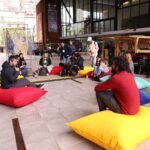- August 25, 2022
- Benjamin Pino

Editorial: Gabriela Carrasco, Program Director Hola América
Do people in Chile hate immigration or poverty? Hola America’s program director and co-director of 2811, Gabriela Carrasco, talks about the migration crisis and how the challenges it poses in the region, especially in Chile, have been addressed.
In September 2021, after a radical group of anti-immigrant groups burned the few belongings of Venezuelan citizens in Iquique, the Fundación Interpreta – which since 2017 seeks to combat hate speech on social networks – unveiled through its project. Xenophobia Barometer that to date have been generated. 477 thousand publications on the Internet related to migration in Chile, with a peak registered days after what happened in Iquique.
This was explained by the executive director of the foundation, Tomás Lawrence, to the newspaper El Mostrador, where he explained that most of these publications reveal, in addition to xenophobia, a class discrimination that places the immigrant in a situation of poverty and vulnerability.
As commercial engineer, political scientist and specialist in social innovation, Gabriela Carrasco, explains, in Chile there is a great phobia of poverty that is exacerbated when immigrants from lower social strata arrive.
Gabriela Carrasco:
Many of them arrive with needs and from vulnerable backgrounds. Instead of seeing the opportunity in diversity, we see immigrants as a threat, especially in a post-pandemic crisis where many have lost their jobs.especially in a post-pandemic crisis where many have lost their jobs.
It is very different how we look at Germans arriving in southern Chile and how we interact with Venezuelans arriving in the north. This distinction is due, in large part, to the fact that we are a country that looks to the north as if it were something closer.
Belonging to the OECD has made us believe that we are a developed country, and we have felt that we are in a different position with respect to the rest of the Latin American countries.
We look at someone arriving from the United States or Europe as a peer, and with superiority to someone arriving from Venezuela. But that is not real, we cannot compare ourselves with developed countries in almost any field if we have not yet solved basic problems in education, housing and health.
In Europe we talk about ‘non-EU nationals’ when talking about Africans. Here, those arriving from the northern hemisphere are considered foreigners and those arriving from Central America are considered immigrants. How does the use of certain terminology create a narrative that assumes certain prejudices from the outset?
Immigration has always existed, but recently it has increased in Latin America and we have to take charge as a country and region because we are living a migratory crisis.
Actions for change
Five years ago, when Chile surpassed its ecological limit, Carrasco co-founded 2811 a platform based in Chile, Colombia, the United States and Germany, which seeks to generate solutions for a more egalitarian and sustainable future.
Today, together with other organizations such as Ashoka, they are leading the implementation of Hola América, a program previously carried out in Europe and whose Latin American version seeks to change the narratives that exist around migration, in order to articulate an ecosystem of host countries that take advantage of its value.
Interview with Gabriela Carrasco
How can we become countries of welcome and not of exclusion?
Hola América proposes to develop a social innovation ecosystem. A Through this we can create safe environments and foster solutions for migrants to have better employment opportunities, access to health and education, and more inclusion.
Therefore, identifies the initiatives that are taking charge of this and we support them in their development, train them and create support networks for the communities. We get involved in public policy, talk to the private sector and think of solutions together.
It has to be a multipronged effort, This is the way to build a welcoming country that takes advantage of the opportunities that are generated. While there is a willingness, there are much remains to be done and to be done from the private sector.
And at the public level?
There is interest and it is a topic. But today’s government no longer has a field to operate in, and has had mixed reactions. What is needed is multisectoral action, from the government and also from civil society and business.
In a world where people talk about the right to move, does such a right really exist?
Populations have the right to move and this possibility should be guaranteed, but it is not. but it is not. In times of crisis, a counter-response is generated and a common enemy is sought in which to place all the responsibility for job losses and inflation.
This generates a nationalist discourse and exacerbates patriotic feelings as a solution. This, in turn, gives way to these discriminatory and xenophobic instances such as the one in Iquique.
This is the opposite of what we want to say: that every newcomer is a potential agent of change and valuable in itself. There are great opportunities in diversity; it is about new perceptions and ways of looking at things. This is always beneficial.
But of course, the feeling is still of threat, and adding that there are no public policies or education on the subject. there are no public policies or education in this regard The immigrant, rather than being a contribution, is a person who is being violated.
What are the pending challenges in Chile?
We have realized that although in Chile there are more developed sectors, such as the generation of jobs and the economic inclusion of immigrants, there is no access to welfare and health, there is no access to welfare and health, and there is also a great lack of xenophobia and discrimination.
The Xenophobia Barometer makes it visible, but there are no programs to reduce it. In Colombia, for example, the entrepreneurial migrant is spoken of and is seen as an agent of change. Here we exclude them or think about how to help them, rather than seeing them as peers.
This can only change with a joint effort; it is necessary to change the way in which immigration is approached at a discursive level (in Argentina there are initiatives that instruct the media on this issue) from concrete public policies.
The discourse is materialized in actions.
Speech sets how people see and hear, it can be very dangerous and that is why polarizing speeches turn into hatred, racism and discriminatory actions.
We are all responsible and together we have to create a collective narrative that addresses immigration from the perspective of opportunity and understanding of differences pIn order for this to manifest itself in actions, such as companies hiring more migrants or the creation of programs for basic education.
Do people in Chile hate immigration or poverty?
There has always been a great aporophobia that increases with migratory waves. Hence, we look one way at those in the north and another way at those in our own region, who have needs and are looking for opportunities.
It is curious that we have bought into the story of being a truly developed country. We are notThe main reason for this is the inequality that exists in this country, which is precisely what gives way to this aporophobia, to classism, and which conditions how migrant communities are viewed.
Moreover, this is a country that even at the urban planning level, it is designed so that we do not mix and rather we are totally segmented.The communities are totally divided, the rich do not have to see poverty in their daily lives if they do not want to, and the indigenous people are relegated to a specific part.
Everything is done so that we don’t have to interact with each other. It is a sectorial division that makes us see on TV that different people arrived and we get scared.
This feeling increases in times of uncertainty.
If we add to that the post-pandemic economic crisis, where we have all been more or less affected, jobs have been lost and there is inflation, it is fertile ground for more nationalism and a sense of enclosure that is then picked up by certain candidacies, such as Trump’s in the United States.
What we often fail to see is that every migrant is a potential entrepreneur, because by migrating he/she is forced to put into practice skills to reinvent him/herself, such as resilience and perseverance. They are people who actively seek a better future. That is the rhetoric that needs to be reinforced.


